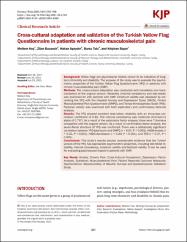Cross-cultural adaptation and validation of the Turkish Yellow Flag Questionnaire in patients with chronic musculoskeletal pain
Citation
Koç, M., et al. "Cross-Cultural Adaptation and Validation of the Turkish Yellow Flag Questionnaire in Patients with Chronic Musculoskeletal Pain." Korean Journal of Pain, vol. 34, no. 4, 2021, pp. 501-508. SCOPUS, www.scopus.com, doi:10.3344/KJP.2021.34.4.501.Abstract
Background: Yellow flags are psychosocial factors shown to be indicative of long-term chronicity and disability. The purpose of the study was to evaluate the psychometric properties of the Turkish Yellow Flag Questionnaire (YFQ) in patients with chronic musculoskeletal pain (CMP). Methods: The cross-cultural adaptation was conducted with translation and back-translation of the original version. Reliability (internal consistency and test-retest) was examined for 231 patients with CMP. Construct validity was assessed by correlating the YFQ with the Hospital Anxiety and Depression Scale (HADS), Orebro Musculoskeletal Pain Questionnaire (OMPQ), and Tampa Kinesiophobia Scale (TKS). Factorial validity was examined with both exploratory and confirmatory factorial analysis. Results: The YFQ showed excellent test/retest reliability with an Intraclass correlation coefficient of 0.82. The internal consistency was moderate (Cronbach’s alpha of 0.797). As a result of the exploratory factor analysis, there were 7 domains compatible with the original version. As a result of confirmatory factor analysis, the seven-factor structure of YFQ was confirmed. There was a statistically significant correlation between YFQ-total score and OMPQ (r = 0.57, P < 0.001), HADS-anxiety (r = 0.32, P < 0.001), HADS-depression (r = 0.44, P < 0.001), and TKS (r = 0.37, P < 0.001). Conclusions: This study’s results provide considerable evidence that the Turkish version of the YFQ has appropriate psychometric properties, including test-retest reliability, internal consistency, construct validity and factorial validity. It can be used for evaluating psychosocial impact in patients with CMP.


















